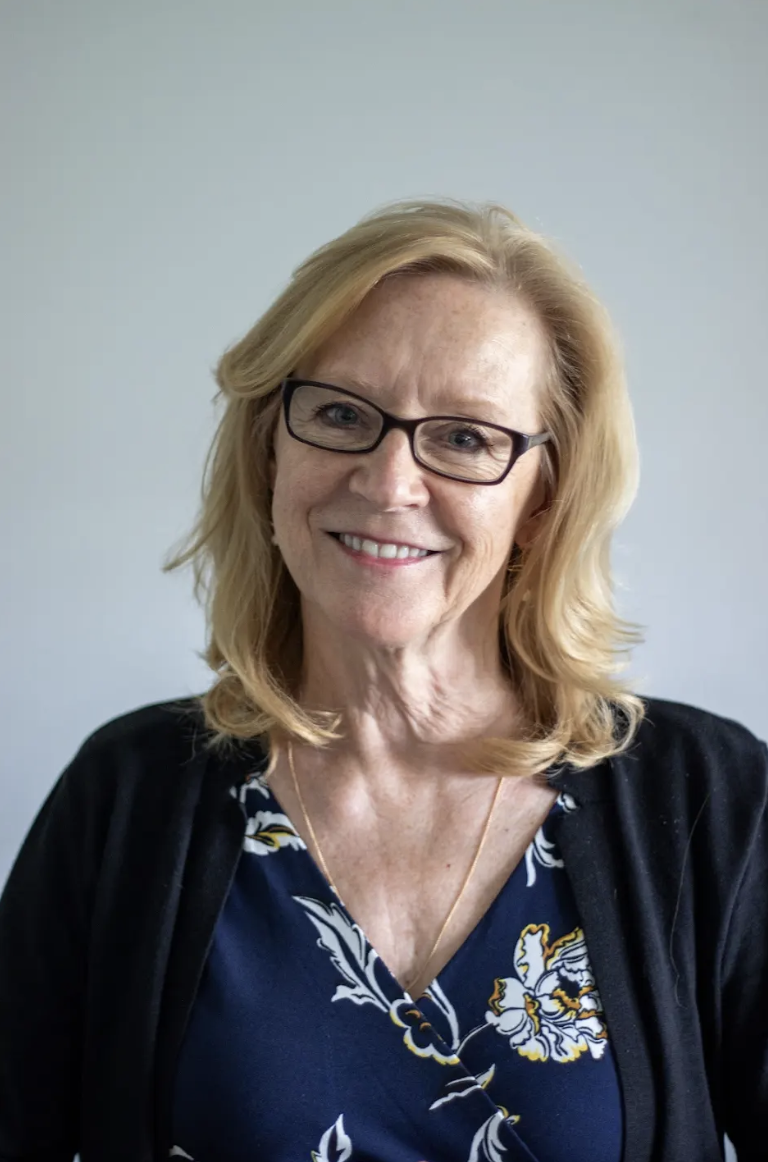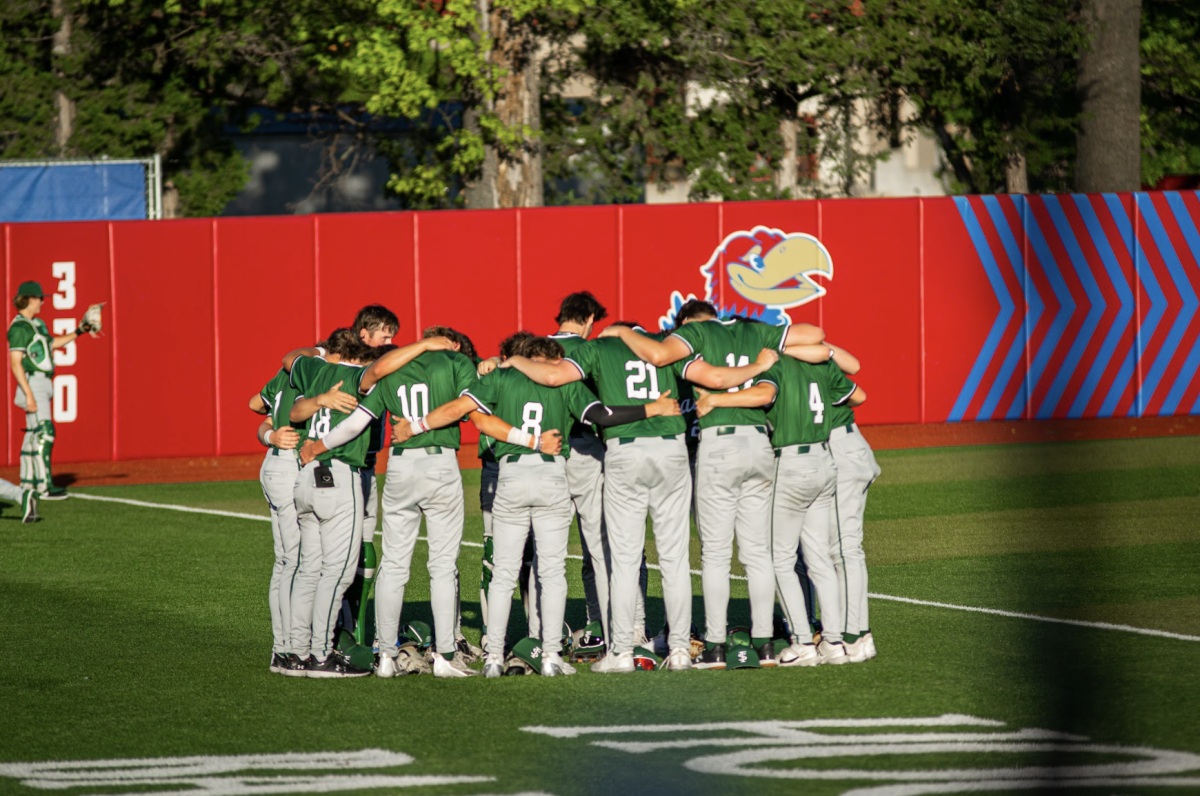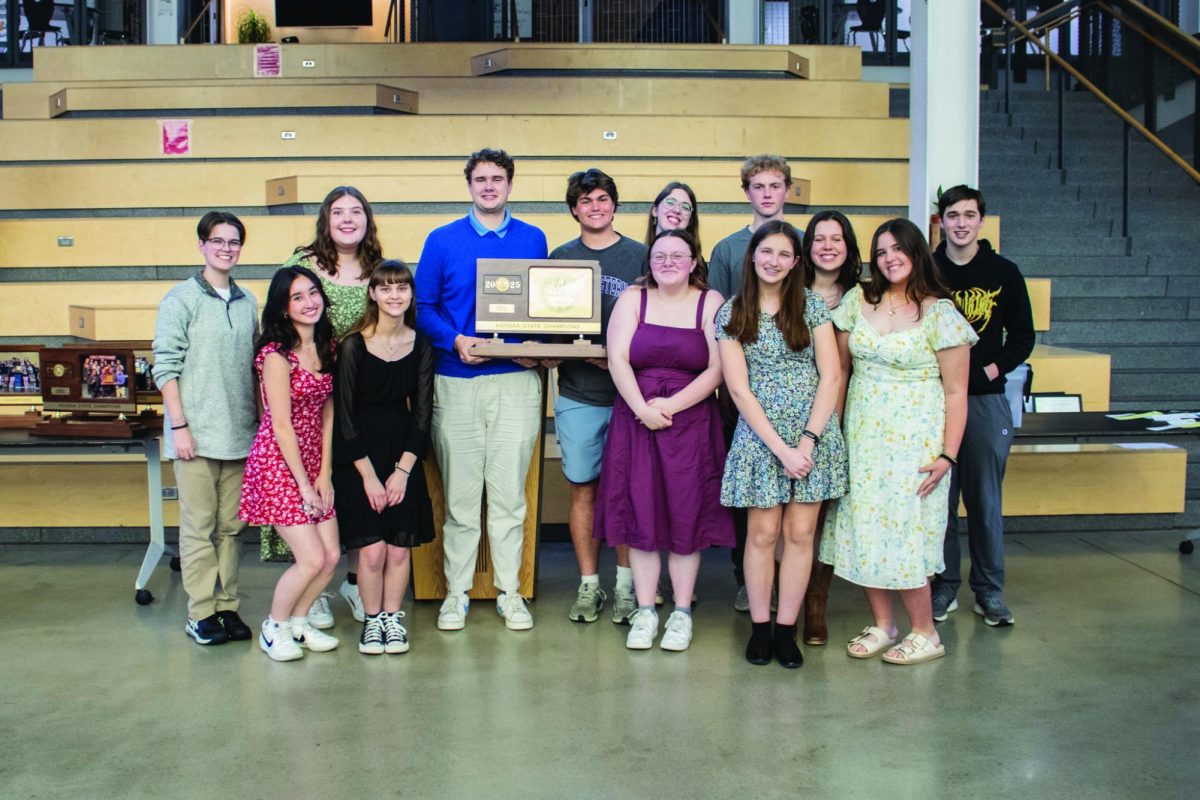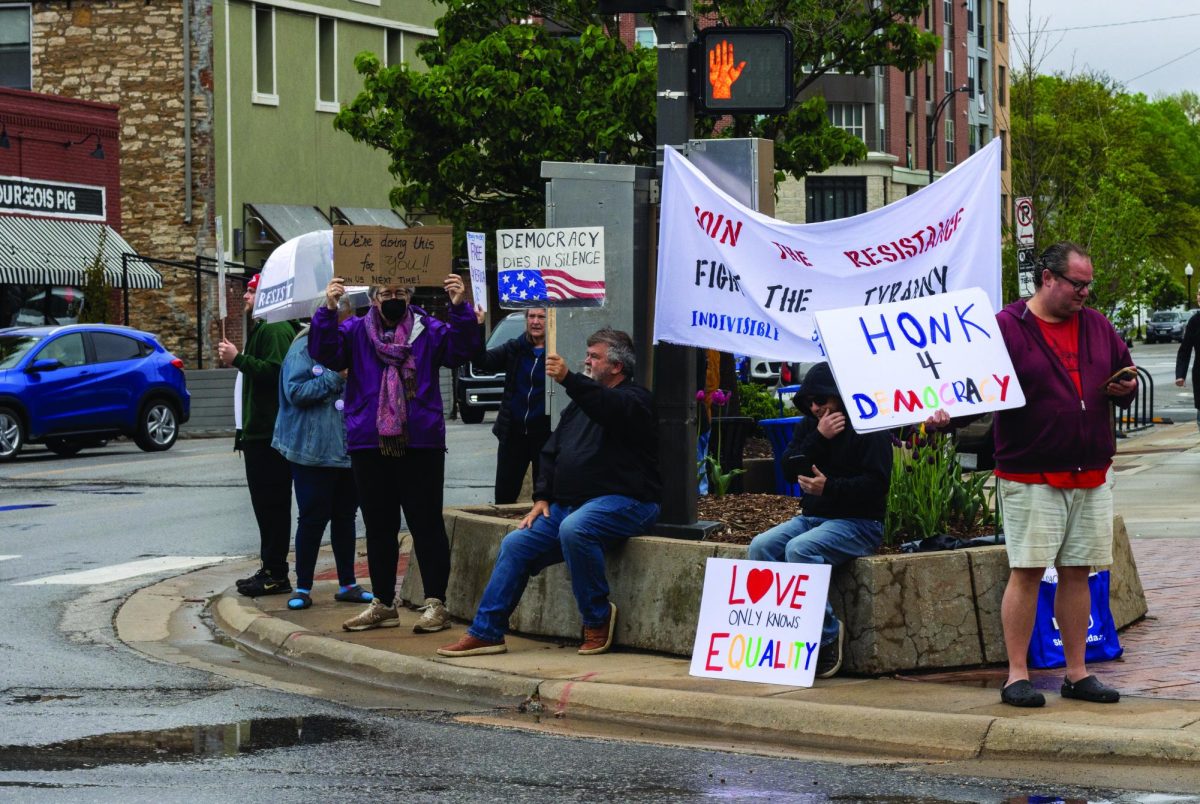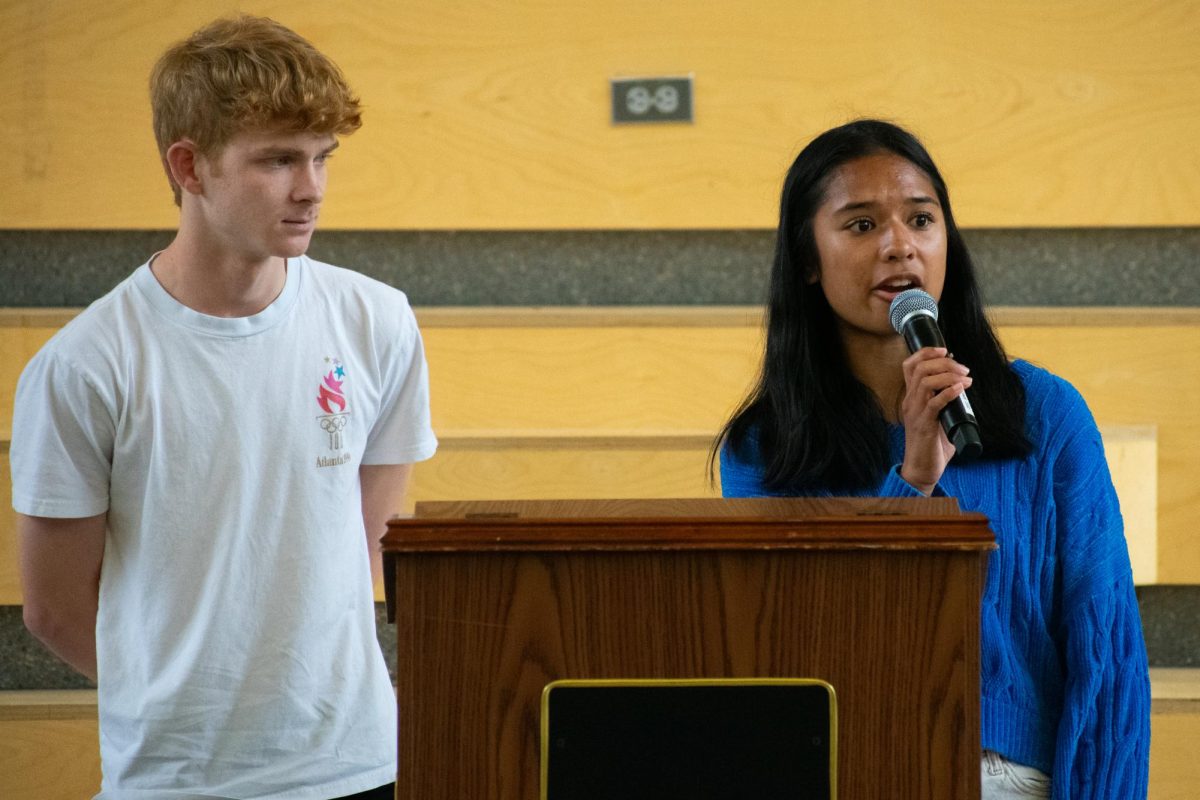From April 18-20, Free State thespians are taking over the Black Box. Students write, direct and act in plays that range from comedic to dramatic genres.
“It’ll Be Alright,” a play written and directed by Lexi Adams and Adam Fales, follows the stories of graduating seniors. One of these stories is for a lesbian character, played by junior Reiss Parsons, struggling on the event of coming out. “It’ll Be Alright” is a drama tailored to suit all current and past students’ theatrical preferences. However, the best way to understand the play is to ask the students who have been creating it.
Main Actress: Reiss Parsons
1.) What is “It’ll Be Alright”’s main plot?
It’s just about a bunch of seniors in high school who are graduating and they are about to go to college. It’s just a bunch of friends that separate and tell their stories.
2.) Could you explain what your character’s monologue is about?
My character is lesbian, she’s just coming out and she hasn’t told anybody yet. She’s kind of afraid to [come out] but she really wants to, so she wants to tell everybody but she just doesn’t have the courage. So my monologues are basically me talking to myself and trying to build up the courage to come out.
3.) Why were so many people attracted to this part? Do you think it has to do with the character being lesbian?
Probably, also because that’s such a specific issue right now. I don’t think there’s been many gay characters in school plays. It’s different and fun,too, so that’s probably why.
4.) What did you do in preparation for this character?
I just read it a lot, then read it to people and just made sure it sounded convincing.
5.) Have you come across any acting struggles with playing a lesbian character? Is it hard to relate? Explain.
Struggle-wise the only thing that I’ve not been too sure on is, “Am I reading it right? Am I having the right mood when I say it?” I just think that I want to make [the part] sound convincing.
6.) How do you try to make the character come alive?
I try to be serious when I’m reading the more serious parts. [I try to] make sure that my emotion is how her’s would be when she’s speaking about something that’s as difficult as it would be to come out. I just want to make sure I don’t mess it up and that I make it seem important because it is important.
7.) The media portrays gay people as a new popular trend or as a popular people, do you think this is accurate? Is “It’ll Be Alright” different? Explain.
No I don’t think it’s accurate. Obviously there [have] been gay people ever since there [were] people. I think now it’s just becoming a social issue. Gay marriage, the legalization and allowing them to do that [has become] so popular; that may be where that stereotype comes from. The play doesn’t follow the trend, what [It’ll Be Alright] really focuses on is just Audrey coming out to her friends.
8.) Is there any controversy surrounding this part? Explain.
I haven’t felt like there is a lot of controversy but definitely a lot of people have brought it up. They’re asking me if I’m nervous or if I don’t like the part, which isn’t true, I think it’s fun. I haven’t come across a lot of controversy.
9.) Why should people see “It’ll Be Alright”?
Definitely because it’s real, it’s less of a comedy, all of the others in this production are more on the funny side and this one is more serious. It’s down to earth about… a group of friends after they graduate. They do have to split up, they might lose touch, it’s definitely everyone coming out of their comfort zone. It’s…really thought provoking, almost down to earth. It’s a good play to see, definitely.
Director/Writer: Adam Fales
1.) What is “It’ll Be Alright”’s main plot?
It’s got multiple plots, there are a bunch of characters. Really it’s about them moving on to life after high school which is kind of a big deal with Lexi and me because we’re seniors and that’s what we’re doing right now.
2.) What impacted or inspired you to write a play with a main character being a lesbian?
We wanted to portray different people who are in high school. We don’t want to pretend that’s not a thing in high school because a lot of people feel like they don’t really talk about it because it’s taboo. There are people who are gay and there are people who are lesbian in high school. It’s just another character dealing with that issue in her life.
3.) What were your feelings when the Black Box approved this play? Were you at all worried if there would be any controversy?
I don’t think I was really worried I was more excited to get to actually produce. I guess I don’t really see [Audrey’s character] as controversial, I feel like it’s just a fact of life. I don’t see any controversy but I can see where other people can see [controversy] in [the part].
4.) How would you react if someone openly opposed “It’ll Be Alright”?
I’m not sure how I would react, I just have a hard time imagining that happening but that might just be me. I probably would just tell them they need to be more accepting.
5.) How does the Black Box approve plays? Was there any trouble approving “It’ll Be Alright”? Explain.
[There wasn’t any trouble] that I know of. The people in charge of Thespian Club, they read all the plays and they choose which ones they would like to see performed the most.
6.) Why were so many people attracted to the main part? Do you think it has to do with the character being lesbian?
Well I think that’s part of it but I think she’s just an interesting character. It’s just as much about her being a lesbian as her just coming to terms with who she is, I think that’s an interesting character to just have in general.
7.) The media portrays gay people as a new popular trend or as a popular people, do you think this is accurate? Is “It’ll Be Alright” different? Explain.
I think the way that the media portrays [gay people] as a sort of trend is just more going along with how it’s finally becoming acceptable to talk about this. I don’t think [the media’s portrayal] is what we’re trying to do, we’re trying to portray it as accurately as we can. Neither Lexi or I [are] gay or lesbian and so we don’t know exactly what it’s like, but we’re trying to do it as we feel it would be.
8.) What main point of “It’ll Be Alright” do you want to get across to the audience?
High school, life, college and everything is tricky.
9.) What is your take on gay marriage?
I don’t see why it’s an issue, I don’t think it should be an issue. I think gays and lesbians should be treated just like any every other person in America and around the world.
10.) Why should people see “It’ll Be Alright”?
I think it’s funny, heartwarming and it’ll speak to a lot of the students here and the parents of students who are going to be going off to college. I’d just like to have people enjoy theater more.
Director/Writer: Lexi Adams
1.) What is“It’ll Be Alright”’s main plot?
It’s about five teenagers that have just graduated high school and their lives are all going in very different directions. It’s told mainly through their thought process and monologues.
2.) How did you come to be director of this play?
Adam and I, who is my co-director, we wrote a play together last year so we wanted to write a play together again this year. We were just brainstorming and going away to college is something that’s really prevalent in our lives right now. Since it’s happening to us we thought, “Oh, let’s make a comedy about it.” But it turned into a drama.
3.) As the director of this play, what responsibilities do you have?
I have to organize everyone into rehearsals and make sure that people attend them. [I have to] make sure they memorize their lines and that the play goes smoothly according to our vision.
4.) Were you at all worried if there would be any controversy surrounding the play?
I was just worried that writing Audrey’s character in particular, we wouldn’t be able to portray the character in a way people could relate to. We didn’t want to offend anyone who was actually experiencing Audrey’s situation. We wanted to make it realistic but we didn’t want to make it too dramatic. We wanted to make it very real life and contemporary because it’s not as controversial as it used to be.
5.) Why were so many people attracted to the main part? Do you think it has to do with the character being lesbian?
I think people were interested in it because it’s a roll that’s not typically offered in high school. It’s harder to become a character that doesn’t make jokes all the time and actually has to embody something serious. I think people were eager to almost be a part of Free State’s little revolutionary role of playing a lesbian character in a real life situation.
6.) The media portrays gay people as a new popular trend or as a popular people, do you think this is accurate? Is “It’ll Be Alright” different? Explain.
I’ve never really heard that before. I like Audrey’s character, I don’t know if it really portrays her as cool but she’s kind of ordinary and down to earth. She’s real and I think she has feelings about wanting to love and be loved just like everyone else. I think that’s important but I don’t think it portrays anything typically in the media, it’s just more real.
7.) What kind of story angle are you creating with “It’ll Be Alright”?
We just wanted to create something that people could relate to. We wanted to make characters that were different and kind of unique. We wanted it to be a drama because it was different than all of the other plays we thought would be submitted.
8.) What impacted or inspired you to write a play with a main character being a lesbian?
We kind of stumbled upon all of our characters partially on accident, we’ve originally tried to base them off of people like our friend group, then we had to expand them. We originally had Audrey’s character being a gay boy, then we thought that was more depicted in media today than lesbians were. We wanted to mix it up.
9.) Why should people see “It’ll Be Alright”?
I think people should see [“It’ll Be Alright”] because it’s well written, relatable and I think it will make people think about their friends or think about their life experiences. If they’ve already graduated high school, they’ll be able to reminisce.







